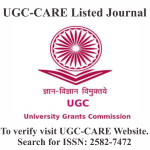GLOBALISATION AND THE ECONOMICS OF HIGHER EDUCATION: A STUDY OF STUDENT CHOICES IN TAMIL NADU
DOI:
https://doi.org/10.29121/shodhkosh.v5.i6.2024.4957Keywords:
Quality of Education, Efficiency, Quality, Students, FeesAbstract [English]
Education which was a “Freed Good” then now becomes a commodity which tags with different price at different market condition. Hence there is a possibility to apply all the theories of economics related to a market can be tested with respect to this commodity of education. Hence, major objective of this research focus to examine the measurement and economics of higher education in Tamil Nadu and to study the factors influence to choice higher education institutions among the students in Tamil Nadu. This study makes use of primary and secondary sources. The primary information was collected on the basis of structured questionnaire from the selected college students by the interview method. Data has been collected from 100 students, in these respondents 50 were male and 50 were female students. Data included cost with its constituents-fixed and variable and course fee, family income, higher secondary school expenses, parental educational qualifications and factors influence to choosing the colleges. This study argue that choice of higher education in the view of reputation of course and college, bus service to the students residence, regarding to fees policy, alumni had acquired jobs in their respected fields and possible to apply education loan and quality of education. This study contributes to the available body of knowledge on this topic and could be used by other researchers as a basis for future research.
References
Amartya Sen (1999). Beyond the Crisis: Development Strategies in India. New Delhi : Capital Publishing Company. DOI: https://doi.org/10.1355/9789814379311
Balakrishnan, Pulapre (2006). Higher Education Needs a Longer View. The Economic and Political Weekly, 41 (32): 3458-9.
Majumdar, Tapas (1997). Economics of Indian Education for the Next Century. The Indian Economic Journal, 45 (4): 39-48. DOI: https://doi.org/10.1177/0019466219980403
Mehta, P.L. (1999). Free and Compulsory Education. New Delhi : Deep and Deep Publication.
Mincer Jacob (1958). Investment in Human Capital and Personal Income Distribution. Journal of Political Economy, 66 (4): 281-302. DOI: https://doi.org/10.1086/258055
Moorthy, Mahendran. (2014). Impact of Choice Factors on Selection of Engineering Institution in India. International Journal of Application or Innovation in Engineering and Management, 3 (5): 28-35.
Samumen Chattopadhyay (2012). Education and Economics. New Delhi : Oxford University Press. DOI: https://doi.org/10.1093/acprof:oso/9780198082255.001.0001
Thomas Alexander, A. (2014). Inclusive Education. Tirunelveli : St. Xavier’s College of Education.
Downloads
Published
How to Cite
Issue
Section
License
Copyright (c) 2024 Dr. V. Siva Elango.

This work is licensed under a Creative Commons Attribution 4.0 International License.
With the licence CC-BY, authors retain the copyright, allowing anyone to download, reuse, re-print, modify, distribute, and/or copy their contribution. The work must be properly attributed to its author.
It is not necessary to ask for further permission from the author or journal board.
This journal provides immediate open access to its content on the principle that making research freely available to the public supports a greater global exchange of knowledge.




















